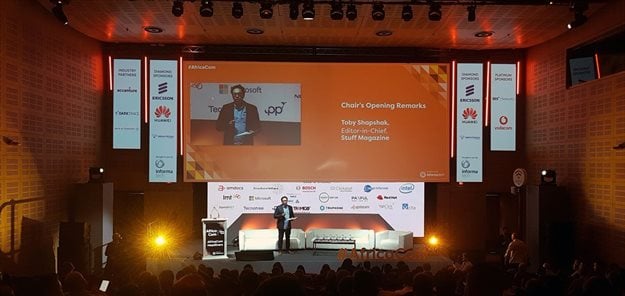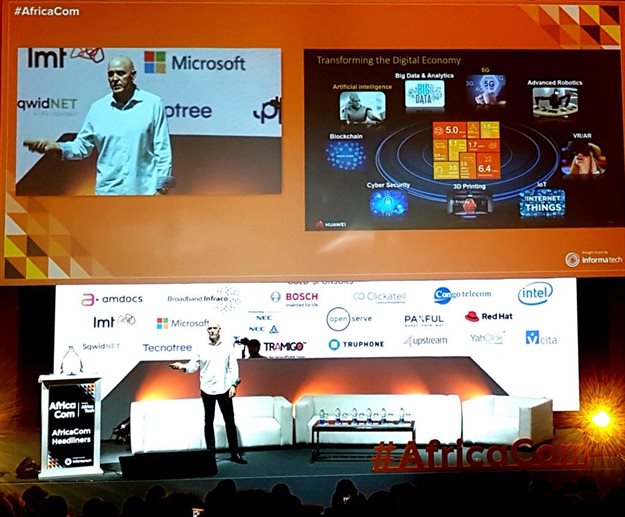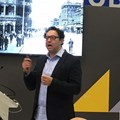#AfricaCom: How to accelerate digital transformation to 5G the right way
Every time someone gets connected, the intention becomes clearer to make the world a better place. This is a byproduct of the telecommunications industry and its renewed drive to inclusivity.
It’s definitely a fast-moving industry, so one of the top challenges is finding ways to enable everyone to participate. That's just the question Shapshak asked most of the morning's speakers.
Shapshak added insights from GSMA’s mobile economy report, which shows that sub-Saharan Africa remains the fastest-growing region, there were 456m unique mobile subscribers last year, bringing it to 44% penetration. That's expected to grow to 623m unique mobile subscribers by 2025, which will be 50% population penetration.
3G finally overtakes 2G in sub-Saharan Africa 2019
That’s steady growth of people accessing the internet and using it regularly in Africa, but more notable is the fact that 3G is set to overtake 2G this year, become the leading mobile technology in the region, responsible for just over 45% of total connections by the end of the year.

Looking to the future, Shapshak said we can’t ignore the advent of newer technologies like 5G, but shouldn't ignore that 3G is a wonderfully robust, reliable technology and enabler.
That said, Shapshak admitted that he doesn’t speak maths as a first language before calling on the first keynote speaker of the morning to expand on the marvellous leaps that have been made in the scientific realm.
It’s all about the money: Transforming the digital economy
Paul Scanlan, CTO of carrier business group at Huawei technologies, says we always need to remind ourselves why we are in business. It's generally all about the money.
In order to drive the digital economy in all sectors, we need to be aware of the following 9 technologies and how they will change our lives:

- Big data and analytics
- Artificial Intelligence
- Blockchain
- Cybersecurity
- 3D printing
- 5G
- Advanced Robotics
- VR/AR
- IoT
Touching briefly on 3D printing, Scanlan mentioned that this is now proving an effective innovation in manufacturing antibiotics, printing skin and even steel bridges across the canals in Amsterdam.
On the current hot topics of AI and 5G, Scanlan said before we get started, we need to be clear on targets. But more than this, we need to know where we are today and how to reach those goals. Ask yourself what are the main platform technologies and enablers, and remember that if you don’t have the money to get the ball rolling, you can’t actually do anything.
It's not all bad news, though...
Connection crucial to innovation
There's no denying that AI is one of the top fields of innovation today, but Scanlan says whether your involvement in the space means you regulate, innovate, or enable others to move forward, you need to understand the connection.
When it comes to the implications of AI, many of us have heard that it will steal our jobs, but if we think back to the outcomes of the three previous industrial revolutions, while it’s true that certain jobs were displaced, more were created, and economies grew in each phase.
We need to be aware of the coming changes and how to work with them so that we don't get left behind. If we do so, we'll realise that AI is not about losing our jobs, nor is it about the rise of Terminator-type robots.
Instead, it’s all about learning, much of which requires data so you can connect. Then to really drive AI, once you have the data, you need to put it into an algorithm. Once it’s in the system it can learn and do reasoning, but we still need the humans that turn the tech on and off.
Scaling to 5G, the right way
Scanlan says it’s about modernising or transforming industries, with the key differentiator across regions in the execution. For example, Scanlan shared that he lives in China, which only allocated 5G a month ago. Despite that, there are already 45,000 5G-based stations in the city he lives in.
Speaking of the benefit of 5G, Scanlan said that it's obviously the faster connection it offers, but remember that it’s essentially a big pool of capacity. It provides the capacity to transform the telecommunications industry and make the individual companies it comprises digital enablers, especially in driving the top industries of health, agriculture, mining, tourism, manufacturing and education in Africa.
5G offers an opportunity to transform, making it just as important as AI, and the first use case has nothing to do with speed, it’s about fixed wireless access, in driving connection using wireless first. But Scanlan said this needs collaboration, in order to provide fibre in the right places.Scanlan added that if you continue to build 2G and 3G, you double the carbon footprint. That alone is a good reason to use the more efficient 4G and 5G frameworks.
Fantastic 5G, from robotic surgery to facial recognition in fish
Scanlan spoke of the ability to perform robotic surgery around the world as well as VR as a consumer and marketing use of Wi-Fi.
In explaining its use in facial recognition of fish, Scanlan said that Norway's primary economy is based on the drilling of oil and gas, but their second-biggest economy is salmon farming.
Paul Scanlan of @Huawei at AfricaCom speaking about IoT, 5G and AI for Africa. Says Africa need to keep investing on 4G to prepare for 5G pic.twitter.com/xutoU7Nujq
— Techzim (@Techzim) November 12, 2019
But while China and Europe are quickly moving towards 5G, it’s important to note that you can’t build 5G without a very robust 4G network in place, to serve as a platform to build and develop that 5G infrastructure. That means Africa shouldn’t look to skip ahead to 5G, we need to continue to build 4G. But it's important to consider how we do so...
Fish farms of the future will include facial recognition systems for salmonhttps://t.co/280c9vMAml@AggieDeSousa reports from Norway pic.twitter.com/Advor2fd77
— Will Kennedy (@wenkennedy) October 8, 2018
He feels the better approach is the collaborative one taken by the UK, France and China.
A collaborative approach to driving a digital Africa
Explaining how 5G takes you to the future, Scanlan spoke of South Africa’s opportunity to now move more customers to 4G and provide better access to inexpensive smartphones, while noting that key among the challenges in building a fully connected Africa, is that of money.
That said, Scanlan concluded on a positive note – he predicts that Africa, as a continent of emerging opportunities, will effectively leapfrog the rest of world but this will take time, initiative, and ambition, so we need to focus on that end-goal target.
In order to accelerate digital Africa, we need to work together and start thinking about the effective policies, infrastructure and ecosystem now, as you don’t get that right overnight.Scanlan closed with a mention of Huawei’s #Tech4All initiative, which they believe will enable 500m people through the programme’s vision to connect for a digital Africa.
It’s all about inclusivity and getting everyone on board – let’s work together to make this an African reality!
Keep an eye on our AfricaCom special section and follow the latest updates on the #AfricaCom2019 hashtag.

































